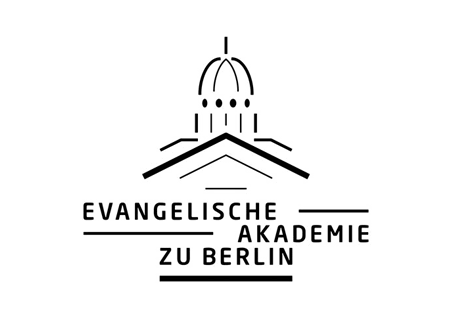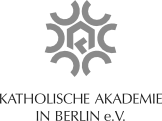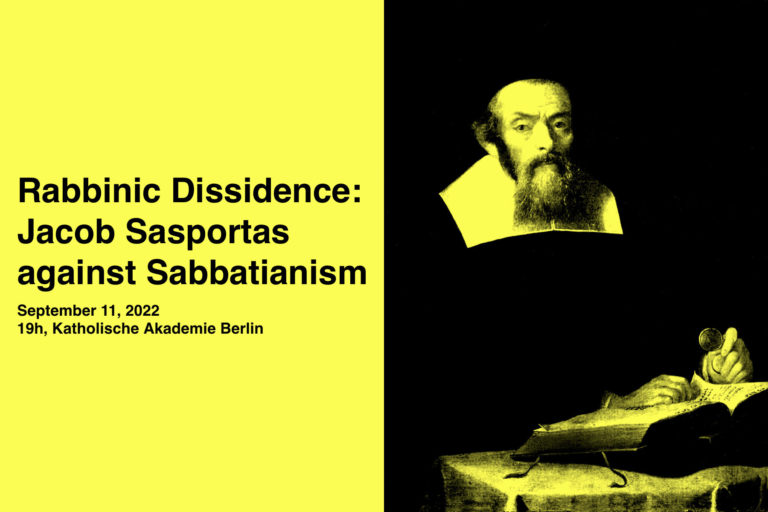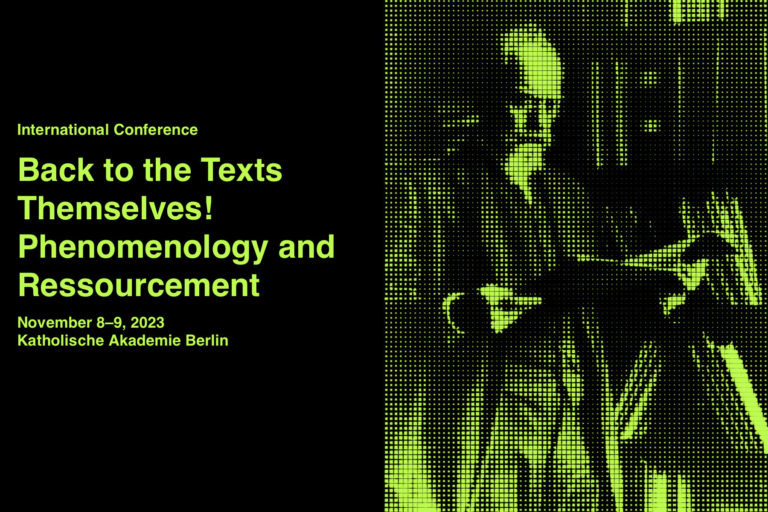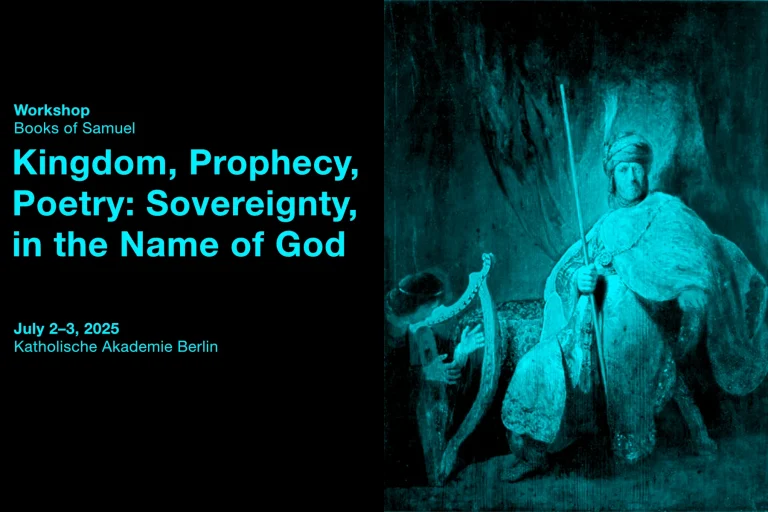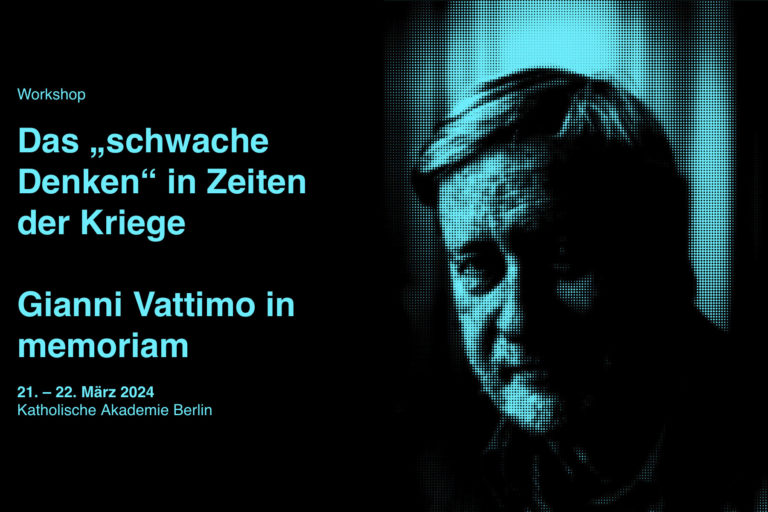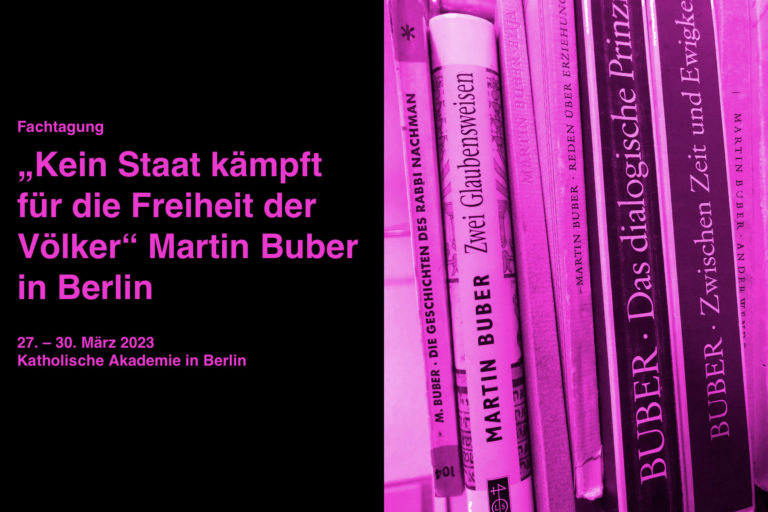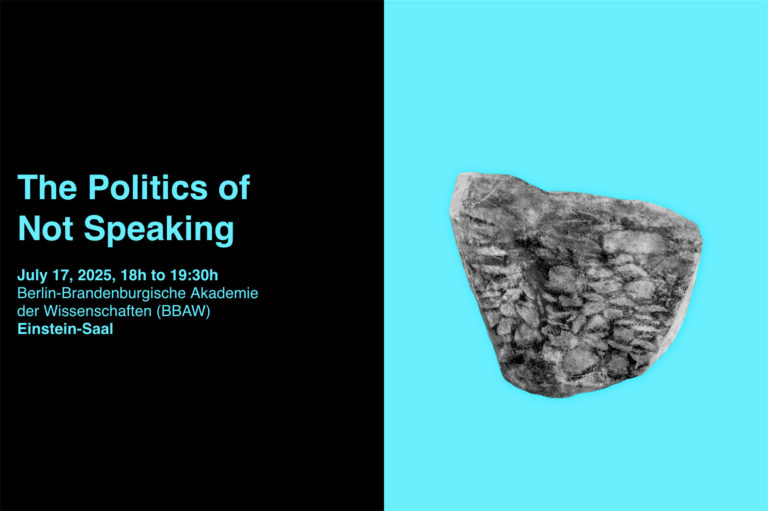Israel und Europa im Spannungsfeld
von Politik und Religion
Kulturphilosophische Reflexionen
zur politischen Aktualität
Symposium anlässlich des 90. Geburtstages von Rabbinerin Prof. Dr. Dr. h.c. Eveline Goodman-Thau
28.–29. November 2024, Katholische Akademie Berlin
Photo: Wikimedia CC-BY-SA-4.0
Israel und Europa im Spannungsfeld von Politik und Religion –
Kulturphilosophische Reflexionen zur politischen Aktualität
Symposium anlässlich des 90. Geburtstages von Rabbinerin Prof. Dr. Dr. h.c. Eveline Goodman-Thau
28.–29. November 2024, Katholische Akademie Berlin
Europe and Israel are currently caught up in a global struggle over the legacy of the Enlightenment in the field of tension between religion and politics, which is reflected in regional conflicts. The effects of this struggle over values, world views and narratives on cultural and social development, the questions of origin and the sustainability of societies are significant.
In terms of cultural policy, fundamental issues are at stake wherever questions about the cohesion of society, the demarcation between the “own and the foreign” – i.e. the question of identity of a people, a nation, a religious community – are taken more seriously than the hard-won unbreakability of values such as freedom of opinion, freedom of religion, freedom of research. In some European countries, we are seeing a transition to an illiberal society. Political actors are expressing their contempt for the procedural processes of a deliberative constitutional state. In the political reality of Israel as a Jewish nation state, these tensions come to the fore with enormous force.
In this context, it seems important to us to consider that one of the late insights of the Enlightenment was that the secularization of value spheres, attitudes and horizons of expectation not only led to the overcoming of religion, but also to the secularization of religious images and content. These serve as narratives, e.g. of national greatness and imperial mission, for the re-mythification of political landscapes. Since the beginning of the 20th century, this development has evolved into a crisis of modernity, in which phases of progression and regression alternate – from the perspective of Enlightenment thinking. There is also a solidification of those forms in which the human mind has always been able to make use of science, philosophy, religion and the arts with the intention of creating identity and integration.
We can see that the problems of modern societies have been intensifying in many places in recent years, especially in the Middle East. 75 years after its foundation, the state of Israel is facing unprecedented challenges and threats that have taken on global dimensions. The intertwining of regional conflicts in global dimensions is particularly evident here. The terrorist will to destroy Israel and Israel’s war against the terrorist regimes of Hamas and Hezbollah radiate across the region into a global media space.
Much is at stake for Israel, ultimately its very existence. The lines of conflict run through an inner-Israeli discourse in which the relationship between state and religion, modernity and tradition and the future of the only democracy in the Middle East are at stake. For Israel, there is also the question of the relationship to the diaspora and, for Jews, the confrontation with the many facets of globally effective anti-Semitism. As a social phenomenon, but above all as a social pathology, this is of depressing permanence.
We want to use the conference to discuss the historical and intellectual background to the developments that articulate a questioning of the modern situation of a liberal, pluralistic and open society that is unbound by tradition. And against this background, we want to take a look at the particular conflict situation in which the state of Israel finds itself in view of the postponed and almost forgotten efforts to achieve a peace process with the Palestinian people and the neighboring Arab states.
The still virulent historical and cultural-philosophical conceptual constellations that underlie both the contrast between traditional and non-traditional societies as well as the concept of multiple modernities will serve as the background for our reflections. Specifically, we mean, for example, the conceptual fields of the individual/ individuality, individuality/ uniqueness/ identity, culture/ culturality/ cultivation, community/ society, freedom/ autonomy, tolerance/ recognition, conversation/ solidarity, reason/ history.
Organization
Prof. Dr. Eveline Goodman-Thau (Hermann-Cohen-Akademie für Religion, Wissenschaft und Kunst, Buchen/Odenwald)
Prof. Dr. Gerald Hartung (Bergische Universität Wuppertal)
Dr. Stephan Steiner (Catholic Academy of Berlin)
Kooperation
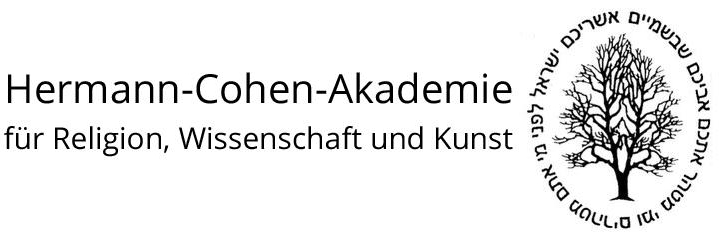
Hermann-Cohen-Akademie
Programm
| Donnerstag, 28. November 2024 | |
| 13:30 Uhr | Empfang Begrüßung und Vorstellung der Veranstalter Eveline Goodman-Thau, Gerald Hartung & Stephan Steiner |
| Sektion I: Messianismus, Monotheismus der Moderne und das Erbe Hermann Cohens | |
| 14:00 Uhr | George Yaakov Kohler (Bar Ilan University) Der lange Schatten von Hermann Cohen – Martin Bubers Reflektionen über Cohen in Jerusalem 1943 Asher Biemann (University of Virginia) “Wenn wir alle Völker geradezu als Zeitgenossen betrachteten…“: Gustav Landauer und das Motiv der Gleichzeitigen im jüdischen Denken der Moderne |
| 15:30 Uhr | Kaffeepause |
| 16:00 Uhr | Anne Eusterschulte (FU Berlin) N.N. Esra Akkaya (Berlin) Sarah Kofmans Oeuvre: Eine Relektüre in 2024 |
| 18:00 Uhr | Abendessen |
| 19:00 Uhr Öffentlicher Abendvortrag in englischer Sprache | (A Woman) Representing Israel at the UN – fifteen years ago and nowadays Prof. Dr. Gabriela Shalev (Jerusalem); Moderation: Prof. Dr. Gerald Hartung (Wuppertal) |
| anschließend Empfang |
| Freitag, 29. November 2024 | |
| Sektion II: Im Schatten des 7. Oktober | |
| 09:15 Uhr | Jeffrey A. Barash (Paris) Wie ist friedliche Koexistenz in einem Zeitalter der Spaltungen möglich? Weimarer Lektionen im Gespräch mit Rudolf Smend, Carl Schmitt und Hermann Heller Yemima Hadad (Leipzig) Buber und Gandhi über Land und Widerstand: Die Lektüre des Briefwechsels nach dem 7. Oktober |
| 10:30 Uhr | Kaffeepause |
| 10:45 Uhr | Christoph Henning (Utrecht) Zur besonderen Situation der Juden in den Niederlanden Christian Bauer (Saarbrücken) Die „jüdische Wunde“ und das Sacrificium intellectus im zeitgenössischen Agitprop |
| 12:00 Uhr | Mittagsimbiss |
| Sektion III: Zachor – Mit Hermann Cohen auf dem Weg in die Zukunft | |
| 13:00 Uhr | Inka Sauter (Frankfurt/M.) Ein ethischer Begriff der Geschichte. Über Hermann Cohen Christoph Kasten (Washington D.C.) Der Mythos im Staat. Zur politischen Platonlektüre bei Hermann Cohen und Ernst Cassirer |
| 14:15 Uhr | Kaffeepause |
| 14:30 Uhr | Christina Sawatzki (Berlin) Messianismus zwischen theologischer Erwartung und politischem Programm Christian Wiese (Frankfurt/M.) Leidenschaft gegen das Inhumane: Die politischen Dimensionen von Abraham J. Heschels Deutung der Prophetie |
| 15:45 Uhr | Podiumsgespräch zum Abschluss; Ende des Symposiums |




